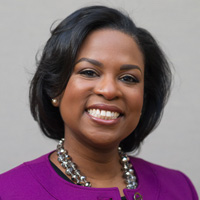
The discussion at our recent Building Chicago’s Inclusive Economy event was a microcosm of all that is right with our great city. The esteemed, engaging panel included an activist turned educator, a former civil servant who represents the interests of the business community, an expert on urban and regional economic growth, and the leader of an organization promoting local retail activity. Collectively, the panel represented creative problem-solvers; people with a diverse set of experiences and backgrounds working together to build a brighter future for our residents and our communities.
Yet, with tremendous assets, Chicago is still a city where many find it difficult—even impossible—to access opportunity and achieve their dreams. Many people and, in some cases, entire communities are excluded from opportunities to succeed in Chicago’s otherwise thriving economy. Panelist Lyneir Richardson, co-founder and CEO of Chicago TREND, defined an inclusive economy as one where any individual who has “an idea and ambition…can get to the finish line.” Simple enough. So why can’t we get there? What keeps Chicago divided between those who are included and those who are not?
Each panelist acknowledged that historic racial segregation and persistent racism are contributing factors, if not root causes, of economic exclusion in Chicago. Alternatively, notions of connection and perception were two themes that struck me as central to the conversation and could, perhaps, hold the key to where we need to go as a city.
An inclusive economy connects people to places where they need to be, to access essential skills or available jobs. Too many communities are isolated. This idea of connection can also be one that is less tangible, but equally necessary, in terms of connecting people with “ideas and ambition” to those with access to capital and opportunities for employment. Many people in our most challenged communities are unaware of what opportunities exist and how to take the first step towards broadening their social networks and realizing their aspirations.
An inclusive economy also does not limit an individual’s potential based on perceptions. Chicago City Colleges’ Chancellor Juan Salgado’s story about one company’s success hiring students who exceeded expectations illustrates what the possibilities can be when negative perceptions are suspended and replaced with a sincere desire to invest in cultivating the next generation of talent.
So, what can we do to help Chicago realize a vision of an inclusive economy? Former Chicagoland Chamber of Commerce CEO Theresa E. Mintle put it plainly: “Stop hiring ourselves.” She urged everyone to stretch beyond their networks and diversify their employees—including experience, education, sector, physical ability, race, ethnicity, and sexual orientation. And, as Nonresident Senior Fellow at the Brooking Institution Metropolitan Policy Center, and CEO of RW Ventures, Bob Weissbourd said: Let’s stop doing things the “old way.” Look instead to new ways of developing communities, investing in entrepreneurs, and providing the necessary skills for workers who can thrive in the markets and economy of the future.
The MacArthur Foundation is committed to finding ways to extend this conversation. We are fortunate to have a platform that allows us to reach a wide audience. In philanthropy, we often have the opportunity to highlight our grantees and brief one another on their accomplishments. However, it is also our responsibility to share the work of these committed organizations and individuals with those who are seldom in the same room and whose exposure to many Chicago communities is only what they see or read in the news. Our Chicago Commitment team, in particular, will continue to seek out those who are tackling systemic problems in new and innovative ways in communities all across the city, help to amplify their voices, and put a spotlight on their successes.
View entire event video below.




